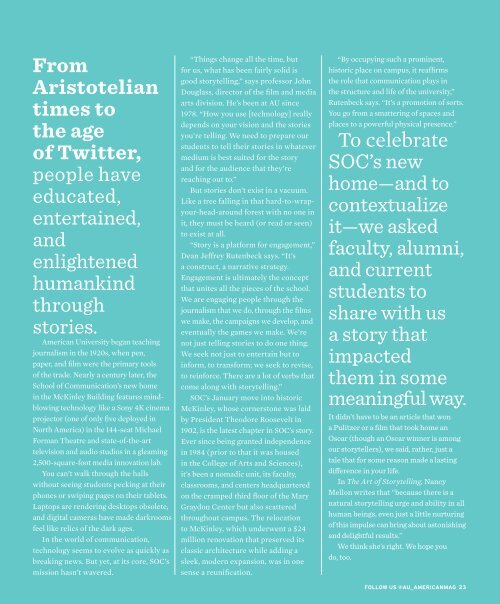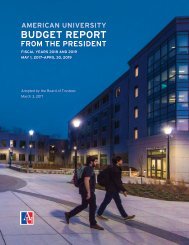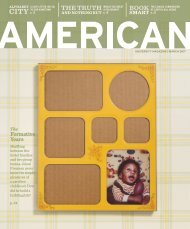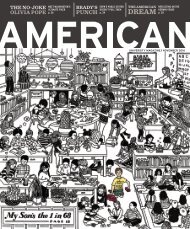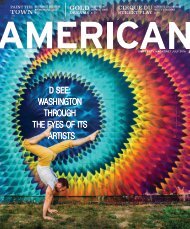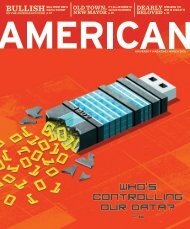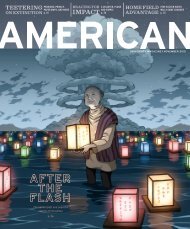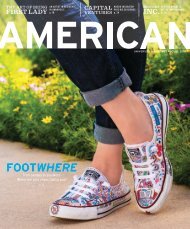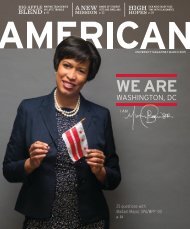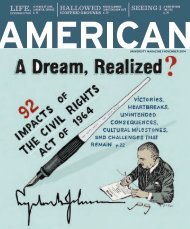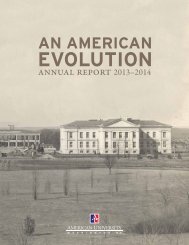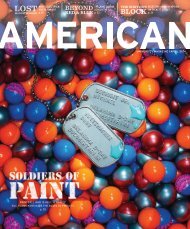American Magazine: August 2014
Create successful ePaper yourself
Turn your PDF publications into a flip-book with our unique Google optimized e-Paper software.
From<br />
Aristotelian<br />
times to<br />
the age<br />
of Twitter,<br />
people have<br />
educated,<br />
entertained,<br />
and<br />
enlightened<br />
humankind<br />
through<br />
stories.<br />
<strong>American</strong> University began teaching<br />
journalism in the 1920s, when pen,<br />
paper, and film were the primary tools<br />
of the trade. Nearly a century later, the<br />
School of Communication’s new home<br />
in the McKinley Building features mindblowing<br />
technology like a Sony 4K cinema<br />
projector (one of only five deployed in<br />
North America) in the 144-seat Michael<br />
Forman Theatre and state-of-the-art<br />
television and audio studios in a gleaming<br />
2,500-square-foot media innovation lab.<br />
You can’t walk through the halls<br />
without seeing students pecking at their<br />
phones or swiping pages on their tablets.<br />
Laptops are rendering desktops obsolete,<br />
and digital cameras have made darkrooms<br />
feel like relics of the dark ages.<br />
In the world of communication,<br />
technology seems to evolve as quickly as<br />
breaking news. But yet, at its core, SOC’s<br />
mission hasn’t wavered.<br />
“Things change all the time, but<br />
for us, what has been fairly solid is<br />
good storytelling,” says professor John<br />
Douglass, director of the film and media<br />
arts division. He’s been at AU since<br />
1978. “How you use [technology] really<br />
depends on your vision and the stories<br />
you’re telling. We need to prepare our<br />
students to tell their stories in whatever<br />
medium is best suited for the story<br />
and for the audience that they’re<br />
reaching out to.”<br />
But stories don’t exist in a vacuum.<br />
Like a tree falling in that hard-to-wrapyour-head-around<br />
forest with no one in<br />
it, they must be heard (or read or seen)<br />
to exist at all.<br />
“Story is a platform for engagement,”<br />
Dean Jeffrey Rutenbeck says. “It’s<br />
a construct, a narrative strategy.<br />
Engagement is ultimately the concept<br />
that unites all the pieces of the school.<br />
We are engaging people through the<br />
journalism that we do, through the films<br />
we make, the campaigns we develop, and<br />
eventually the games we make. We’re<br />
not just telling stories to do one thing.<br />
We seek not just to entertain but to<br />
inform, to transform; we seek to revise,<br />
to reinforce. There are a lot of verbs that<br />
come along with storytelling.”<br />
SOC’s January move into historic<br />
McKinley, whose cornerstone was laid<br />
by President Theodore Roosevelt in<br />
1902, is the latest chapter in SOC’s story.<br />
Ever since being granted independence<br />
in 1984 (prior to that it was housed<br />
in the College of Arts and Sciences),<br />
it’s been a nomadic unit, its faculty,<br />
classrooms, and centers headquartered<br />
on the cramped third floor of the Mary<br />
Graydon Center but also scattered<br />
throughout campus. The relocation<br />
to McKinley, which underwent a $24<br />
million renovation that preserved its<br />
classic architecture while adding a<br />
sleek, modern expansion, was in one<br />
sense a reunification.<br />
“By occupying such a prominent,<br />
historic place on campus, it reaffirms<br />
the role that communication plays in<br />
the structure and life of the university,”<br />
Rutenbeck says. “It’s a promotion of sorts.<br />
You go from a smattering of spaces and<br />
places to a powerful physical presence.”<br />
To celebrate<br />
SOC’s new<br />
home—and to<br />
contextualize<br />
it—we asked<br />
faculty, alumni,<br />
and current<br />
students to<br />
share with us<br />
a story that<br />
impacted<br />
them in some<br />
meaningful way.<br />
It didn’t have to be an article that won<br />
a Pulitzer or a film that took home an<br />
Oscar (though an Oscar winner is among<br />
our storytellers), we said, rather, just a<br />
tale that for some reason made a lasting<br />
difference in your life.<br />
In The Art of Storytelling, Nancy<br />
Mellon writes that “because there is a<br />
natural storytelling urge and ability in all<br />
human beings, even just a little nurturing<br />
of this impulse can bring about astonishing<br />
and delightful results.”<br />
We think she’s right. We hope you<br />
do, too.<br />
FOLLOW US @AU_AMERICANMAG 23


